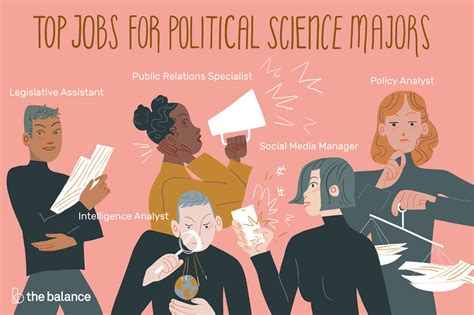Introduction

A Master’s degree in Political Science opens doors to a diverse range of fulfilling careers in the public, private, and non-profit sectors. This advanced qualification provides students with the knowledge, skills, and critical thinking abilities necessary to navigate the complex world of politics and policymaking.
Benefits of a Masters in Political Science
1. Enhanced Career Opportunities:
- A Master’s degree expands your career options, making you eligible for higher-level positions in government, international organizations, think tanks, and more.
- According to The Balance Careers, individuals with a Master’s in Political Science earn 23% more than those with only a Bachelor’s degree over their lifetime.
2. Specialization and Expertise:
- Masters programs often offer concentrations in specific areas, such as public administration, international relations, or political theory, allowing you to develop specialized knowledge and skills in your chosen field.
3. Advanced Analytical and Research Skills:
- The program trains you in advanced research methods, data analysis, and critical thinking, valuable skills for a wide range of careers.
4. Network Building and Connections:
- Master’s programs provide opportunities to connect with professors, classmates, and professionals in the field, expanding your network and potential job opportunities.
Career Paths for Masters in Political Science Graduates
1. Government and Public Policy:
- Policy Analyst
- Legislative Aide
- Government Relations Specialist
- Public Administrator
2. International Affairs:
- Foreign Service Officer
- International Relations Analyst
- United Nations and Embassy Staff
- Global Governance Expert
3. Nonprofit and Advocacy:
- Program Manager
- Advocacy Director
- Fundraiser
- Social Policy Analyst
4. Education:
- Professor
- Teacher
- Researcher
5. Private Sector:
- Political Risk Analyst
- Public Affairs Consultant
- Corporate Lobbyist
- Government Relations Specialist
Motivations and Pain Points
Motivations:
- Passion for politics and policymaking: Graduates are driven by a desire to shape the world and make a difference.
- Intellectual curiosity: They enjoy analyzing complex issues, understanding political processes, and developing evidence-based solutions.
- Career advancement: They seek to enhance their skills and qualifications for higher-level positions.
Pain Points:
- Competition for jobs: The job market can be competitive, particularly in government agencies and international organizations.
- Long hours and demanding workload: Many careers in political science require long hours and a high level of dedication.
- Political polarization: The field can be subject to political polarization, which can impact job opportunities and career paths.
How to Choose the Right Masters Program
1. Consider Your Career Goals: Identify your target career path and research programs that offer the appropriate concentrations and specializations.
* Example: If you aspire to be a Policy Analyst, look for programs with a strong focus on quantitative methods and policy analysis.
2. Research Program Reputation: Check the rankings and accreditations of potential programs to ensure their academic rigor and recognition in the field.
* Example: The University of California, Berkeley’s Master’s in Public Policy program is consistently ranked among the top programs in the United States.
3. Faculty Expertise: Review the faculty profiles to identify professors with expertise in your areas of interest and who can provide mentorship and guidance.
* Example: The London School of Economics and Political Science is known for its faculty of renowned political scientists, including scholars in international relations and comparative politics.
4. Consider Program Structure: Determine if the program is a full-time, part-time, or online program that fits your schedule and learning style.
* Example: The University of Southern California offers a part-time Master’s in Public Administration program designed for working professionals.
5. Explore Funding Options: Research scholarships, fellowships, and teaching assistantships that can help offset the cost of your education.
* Example: The American Political Science Association (APSA) offers a variety of fellowships and grants for political science students.
Pros and Cons of a Masters in Political Science
Pros:
- Enhanced career opportunities
- Specialization and expertise
- Advanced analytical and research skills
- Network building and connections
Cons:
- Competitive job market
- Long hours and demanding workload
- Political polarization
Conclusion
A Master’s degree in Political Science provides a transformative educational experience that empowers graduates with the knowledge, skills, and connections to pursue meaningful careers in a variety of sectors. By carefully considering your career goals, researching program offerings, and leveraging resources, you can unlock the full potential of a graduate degree in political science and embark on a path of impact and fulfillment.
Tables
Table 1: Median Annual Salaries for Masters in Political Science Graduates
| Occupation | Median Annual Salary |
|---|---|
| Policy Analyst | $85,280 |
| Legislative Aide | $65,330 |
| Government Relations Specialist | $95,060 |
| Public Administrator | $96,940 |
Table 2: Top Universities for Masters in Political Science
| University | Rank |
|---|---|
| Harvard University | 1 |
| Princeton University | 2 |
| Yale University | 3 |
| Stanford University | 4 |
| University of California, Berkeley | 5 |
Table 3: Career Paths for Masters in Political Science Graduates
| Career Path | Sector |
|---|---|
| Policy Analyst | Government, Nonprofit |
| Legislative Aide | Government |
| Government Relations Specialist | Private, Nonprofit |
| Public Administrator | Government, Nonprofit |
| Foreign Service Officer | International |
| International Relations Analyst | Private, Nonprofit |
| Program Manager | Nonprofit |
| Advocacy Director | Nonprofit |
| Professor | Education |
| Political Risk Analyst | Private |
Table 4: Advantages and Disadvantages of a Masters in Political Science
| Advantage | Disadvantage |
|---|---|
| Enhanced career opportunities | Competitive job market |
| Specialization and expertise | Long hours and demanding workload |
| Advanced analytical and research skills | Political polarization |
| Network building and connections |
